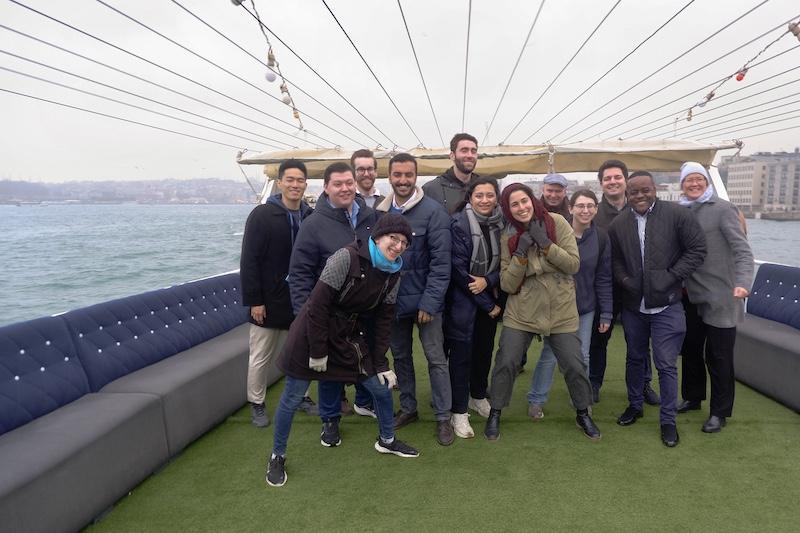
Fletcher Russia and Eurasia Program study tour provides students key insight on complex geopolitics
Though the spring semester has concluded, student researchers at The Fletcher School’s Russia & Eurasia Program have been hard at work on a policy paper explaining the special role that Turkey plays in geopolitics between Russia and the West, a topic of increasing importance amidst the war in Ukraine.
The paper builds off of the program’s recent study trip to Turkey. Over spring break in March, 11 students traveled to Istanbul and Ankara to gather firsthand insight on the country’s role, both regionally and globally.
"Turkey holds a unique position on the global stage due to its strategic location, regional ambitions, and balancing act between Russia and the West,” said Arik Burakovsky MALD17, assistant director of the Russia and Eurasia Program. “Its role as an intermediary in regional conflicts and its NATO membership further contribute to its relevance in global politics.”
He added that Turkey finds itself in a delicate balancing act, negotiating strained relations with the United States and other Western countries.
“As Turkey seeks to establish itself as a regional power, it must navigate the complexities of its relationships and reassess its policies and alignments accordingly. This unique geopolitical role allows Turkey to influence regional dynamics and contribute to global stability,” he added.
During their tour, the Fletcher delegation met with local foreign policy experts, practitioners, and students; took part in panel discussions, roundtables, and guest lectures at local universities and think tanks; and briefed U.S. and Turkish diplomats and policymakers.
MALD student Collin Husted F23 joined the study tour to hear directly from stakeholders in the region about the Russian invasion of Ukraine. The trip provided him with essential “working knowledge of Russian foreign policy, modern conflict studies, and the role that technology plays in contemporary warfare.”
“My perspective on the Turkish government has shifted significantly,” said Husted. “Prior to the study trip, I hadn’t fully appreciated the tenuous position the country occupies as a NATO member in Russia’s backyard and the lack of support the country has felt from its Western partners.”
“The perceived lack of support has led to a broader undermining in relations, as the country doesn’t feel comfortable relying on Western assistance should Russia ever actually invade or occupy territory. By maintaining a more neutral stance, however, the Turkish government has managed to make itself the only Western ally capable of potentially facilitating peace talks,” he added.
Jessica Pacheco F24, a GBA student, has worked in public relations and marketing in the defense and aerospace innovation sectors. She joined the tour given her strong interest in Eastern European studies; she lived in Ukraine between 2011 and 2015, when the conflict first broke out.
“I was surprised to discover the close relationship between Turkey's energy sector and Russia.
Despite the vulnerabilities of such partnerships, Turkey continues to invest heavily through bilateral agreements with Russia. Yet, Russia is known for using energy resources as a political tool to manipulate other countries’ policies and actions,” said Pacheco.
“The potential risks involved in such partnerships are significant, making it even more surprising that Turkey is still pursuing them. However, during the trip, I had the opportunity to learn about the economic and strategic reasons behind Turkey's decision to maintain its energy ties with Russia.”
Energy was a key interest for Ramsha Hameed F23, an MIB student who studies how countries use trade to influence foreign policy, and the resulting strategic implications on a country’s climate change goals.
“As my capstone focuses on the impact of the Russia-Ukraine war on global agriculture trade and the EU’s energy trade diversification, the learnings from this study trip were pivotal in understanding the emerging geopolitical role of Turkey and strategies its neighboring countries are undertaking, especially with respect to energy security and trade diversification,” she said.
“My perspective has evolved to account for the changing dynamics of power in the global world, especially with respect to the decreasing influence of Western powers, and how Turkey is well-positioned to assert itself as an emerging great power given the various alliances and facilitation it has offered other countries who have been in conflict with each other. Given the economic and political role China, Japan, India, and Saudi Arabia are playing in the Russia-Ukraine war, Turkey due to its strategic location, is well-positioned to play a large role in global affairs.”
Pacheco similarly noted that the trip was essential in transforming her perspective on Turkey in the world.
“I now realize the importance of making strategic decisions considering the complex relationships
between different countries and their regional alliances and not taking our allies for granted,” said Pacheco. “Overall, the study trip has broadened my understanding of global affairs and given me a new perspective on the issues we study at Fletcher.”
Mentored by Burakovsky and four professors, including Chris Miller, Volodymyr Dubovyk, Monica Toft, and Ivan Arreguín-Toft, the group plans to complete their policy paper in June, following Turkey’s parliamentary and presidential elections.
Read more about the Fletcher Russia and Eurasia Program.